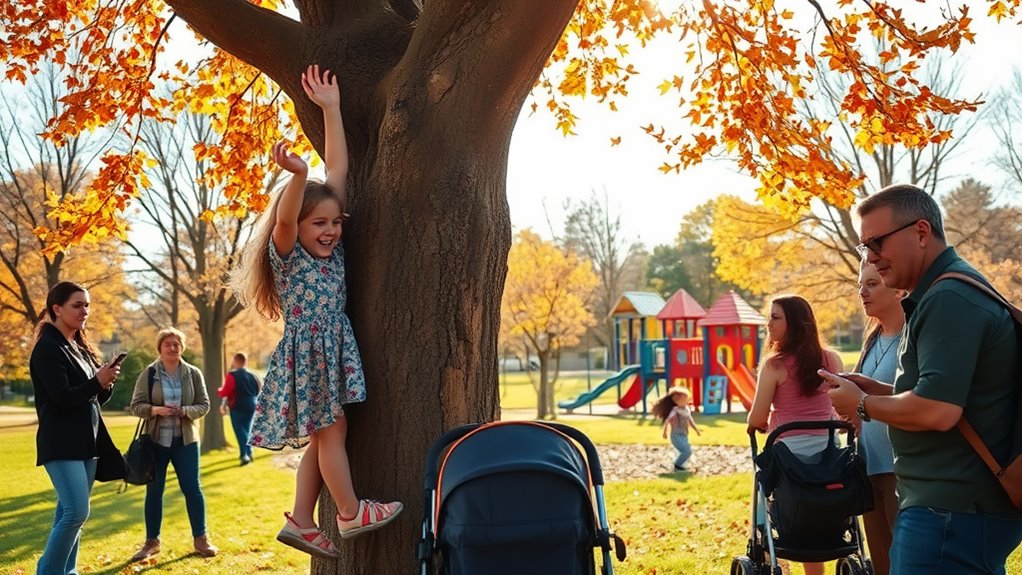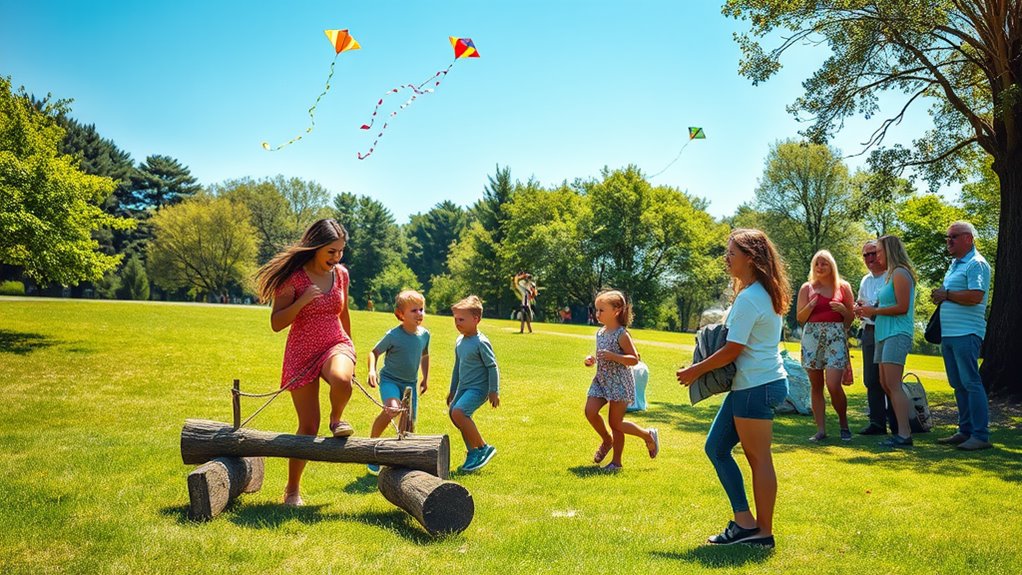Navigating Social Expectations as a Free-Range Parent
Maneuvering social expectations as a free-range parent means trusting your instincts while clearly communicating your choices. Friends and family might question your safety decisions, but it’s important to explain the benefits of independence and confidence your child develops. Start with manageable risks, like letting them walk to a friend’s house alone, so they learn responsibility. Connect with other like-minded parents to share experiences, reduce feelings of isolation, and find support. Celebrate your child’s achievements and frame their mistakes as growth moments. By doing this, you’ll strengthen your beliefs, and there’s plenty more to unpack about building your parenting community.
Understanding Free-Range Parenting

When it comes to parenting styles, free-range parenting stands out for its emphasis on autonomy and independence. This approach encourages you to give your kids the freedom to explore their surroundings and make their own choices. You’re not just hovering over them; instead, you’re fostering their confidence and problem-solving skills.
By allowing your children to take risks, you help them develop resilience and self-reliance. Free-range parenting is based on the belief that kids learn best through experience. When they’re given the chance to navigate the world on their own, they discover their strengths and weaknesses.
You might find that your child becomes more responsible and capable as they face challenges, whether it’s figuring out how to get home from school or managing their time during playdates.
Of course, this doesn’t mean you’re completely hands-off. You still maintain a supportive presence, guiding them when necessary, and ensuring they know you’re there for them.
It’s about finding the right balance between independence and safety. This parenting style can be incredibly rewarding, allowing both you and your child to grow together while building trust and confidence.
Common Societal Pressures

As you embrace the free-range parenting philosophy, you might start to feel the weight of societal pressures that challenge your approach. Friends, family, and even strangers may question your choices, often suggesting that you’re not doing enough to keep your child safe. They might express concern about your child playing outside unsupervised or walking to school alone.
These pressures can create doubt, making you wonder if you’re making the right decisions. You may also encounter school environments that reinforce more traditional parenting styles, emphasizing structured activities over independent exploration.
Many parents around you may share stories of organized playdates and constant supervision, making it easy to feel isolated in your beliefs. Social media can amplify these pressures, as you scroll through images of meticulously planned activities and parenting success stories that seem to set the bar higher.
It’s essential to remember that while these pressures are common, they don’t define you or your parenting style. Trust in your instincts and the values you hold dear, and know that free-range parenting fosters resilience, creativity, and independence in your child.
Embrace your journey, even when others mightn’t understand it.
Strategies for Balancing Independence

Often, finding the right balance between granting your child independence and ensuring their safety can feel like walking a tightrope. To navigate this challenge, start by evaluating your child’s age and maturity level. Younger kids may need more guidance, while older children can handle greater freedom.
Encourage your child to take small, manageable risks. For example, let them walk to a friend’s house alone or choose their outfit for school. These experiences build confidence and decision-making skills.
You can also set clear boundaries and expectations. Discuss safety rules, like checking in when they’re out or not talking to strangers.
Involve your child in the process by asking for their input. This empowers them and fosters a sense of responsibility. Celebrate their successes, no matter how small, and reassure them that mistakes are part of learning.
Building a Supportive Community

Creating a network of supportive individuals can make a world of difference for free-range parents. Surrounding yourself with like-minded people who understand your parenting style helps you feel less isolated.
Start by connecting with other parents who share your values. You might join local parenting groups, attend community events, or even engage in online forums where free-range parenting is discussed.
Don’t underestimate the power of friendships. Having friends who support your choices can boost your confidence and provide a safe space to share experiences and challenges.
When you face criticism or doubt from others, your supportive circle can remind you why you chose this path.
Consider reaching out to neighbors and building connections with families in your area. Organizing playdates or casual get-togethers can help foster a sense of community.
Celebrating Your Parenting Choices

Finding a supportive community can empower you to embrace your free-range parenting choices fully. When you connect with others who share your approach, it helps you feel confident in your decisions. Your parenting style, which encourages independence and exploration, is a wonderful way to raise kids who can think for themselves.
Celebrate those choices by acknowledging the unique experiences that come with free-range parenting. Share stories with friends or online groups about your child’s achievements, whether it’s climbing a tree or walking to a friend’s house alone. Recognizing these milestones not only boosts your confidence but also inspires others in your network.
It’s also important to remember that everyone has different parenting philosophies. While not everyone may understand or agree with your choices, staying true to what works for your family is essential. Embrace the conversations around your parenting style; they can lead to deeper connections and greater understanding.
Ultimately, celebrating your choices reinforces the value of independence and resilience in your children. By being proud of your decisions, you model the importance of following one’s beliefs, which is a powerful lesson for your little ones.
